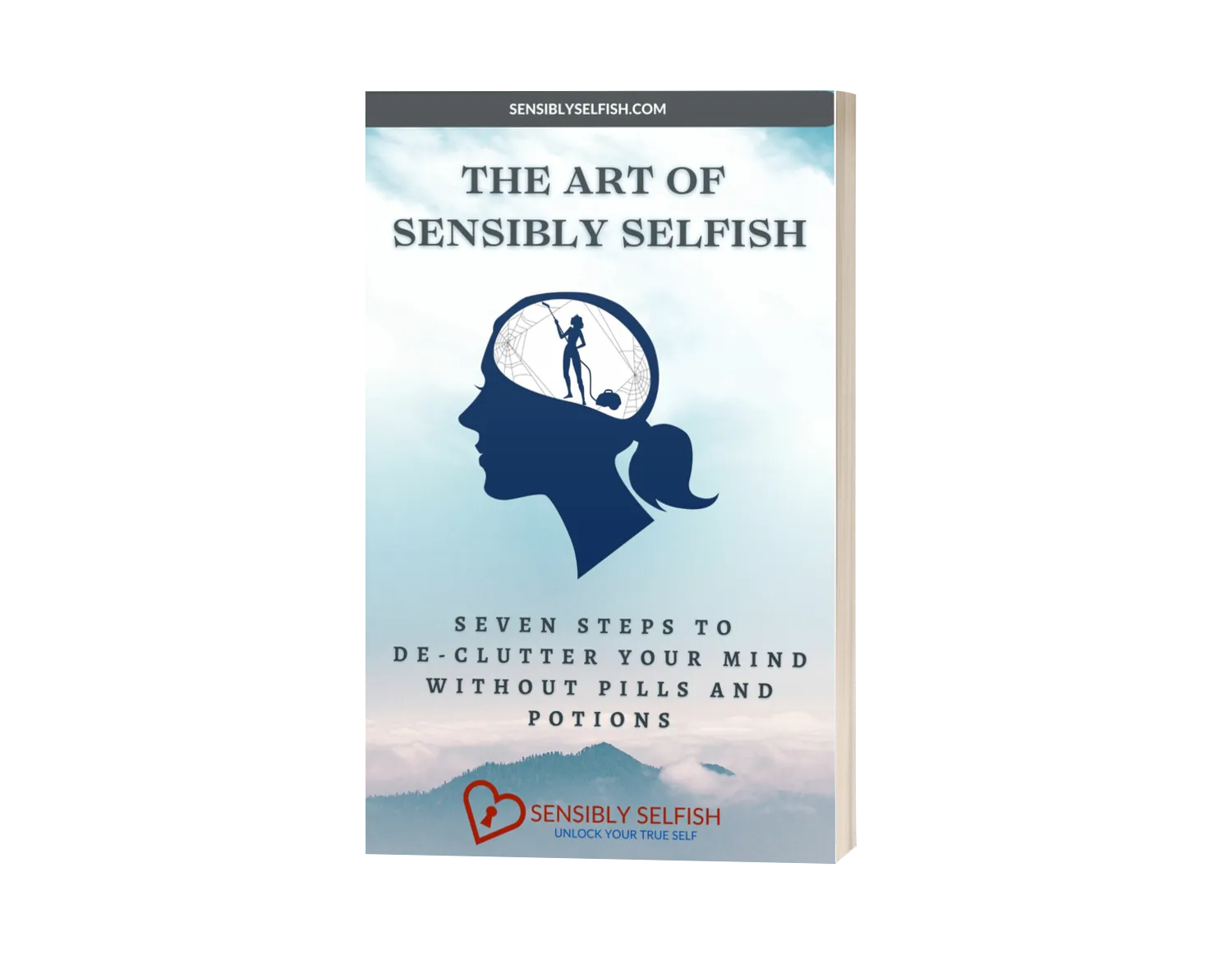Redefining Empty Nest Syndrome
Ten Sensibly Selfish Steps to Success
[Toc]
Birds and Empty Nests

Have you ever pondered the lives of baby birds and their families, envisioning them migrating together as a tightly-knit unit, living harmoniously in a flock? Sadly, reality paints a different picture. Most birds go their separate ways once the nesting season ends, leaving their young ones to navigate the world on their own.
Interestingly, bird parents don't appear to mourn the departure of their offspring. Both parents and their young demonstrate remarkable independence, with parents often embarking on their southward journey long before their offspring follow suit.
However, for some individuals, particularly women, watching their child leave the nest can be emotionally distressing, and endure as if experiencing a loss. This phenomenon, known as empty nest syndrome, can create a void that seems impossible to fill, as was the case for Elaine. Despite having pride in her two accomplished and well-rounded children, she was struck by the overwhelming sense of loss.

Elaine, overwhelmed with grief, expressed her anguish, equating the departure of her children with the loss of her father. "First my father, now my youngest, I've lost them both," she sobbed. It took time for her emotions to subside, allowing for a more coherent conversation. In her eyes, the pain was indistinguishable.
"I'm at a loss. I feel completely adrift. I lack purpose, interest, confidence, and experience. I'm utterly lost. One moment I feel somewhat okay, and the next, I can't control the tears," she confided, her voice filled with sorrow.
Empty nest syndrome can be a challenging experience, affecting individuals who have devoted a significant part of their lives to raising children. The transition can leave them grappling with a sense of identity and purpose. However, it is essential to remember that this phase is not the end but an opportunity for personal growth and exploration.

What is an Empty Nest?
The empty nest is a multifaceted concept that extends beyond the immediate departure of children from home. While it can feel overwhelming, it's important to recognize that it is just one of the many natural transitions that parents experience. This phase offers an opportunity for introspection, taking a moment to appreciate the shared moments and cherished memories with our children.
Empty Nest Syndrome is commonly associated with a temporary phase that occurs when children leave home, typically around September when they embark on their journey to pursue higher education. However, it is interesting to note that in traditional cultures where intergenerational care and respect are deeply ingrained, the signs of empty nest syndrome are less prevalent. As society becomes more mobile and extended families become geographically dispersed, the concept of empty nest syndrome becomes more prevalent. It encompasses any period when an older child establishes a permanent life away from the family home.
Recognizing empty nest syndrome may not always be straightforward, and while it may not be classified as life-threatening by medical professionals, it can escalate into severe depression, necessitating medical intervention. It's important to mention that Empty Nest Syndrome is not officially recognized in the Diagnostic and Statistical Manual of Mental Disorders (DSM-5), which serves as the authoritative guide for mental health conditions.
Empty nest syndrome can affect both women and men, but it is often full-time parents who are particularly vulnerable. Those who struggle with change, grapple with other life transitions such as menopause, retirement, or the challenges of caring for aging parents, or those who have concerns about their child's readiness to leave home or experience relationship issues with their spouse, are more susceptible to this syndrome.
While many parents thrive and find joy in seeing their children embrace independence, if you or your partner are experiencing difficulties during this transition, it is essential to explore further and seek support.

Symptoms of Empty Nest Syndrome
1. Overwhelming sadness and a deep sense of loss.
2. Experiencing frequent episodes of excessive crying.
3. Persistent feelings of loneliness and emptiness.
4. Withdrawing from social interactions and avoiding contact with friends and family.
5. Feeling a sense of uselessness or that life has lost its purpose.
6. Overwhelm and difficulty adjusting to the new phase of life.
7. Disrupted sleeping and eating patterns, experiencing changes in appetite or insomnia.
8. Spending excessive amounts of time in the child's bedroom, clinging to memories.
9. Experiencing feelings of guilt, questioning whether you did enough as a parent.
10. Feeling anxious and disoriented, unsure of how to navigate this new chapter.
11. Loss of self-identity, struggling to define oneself beyond the role of a parent.
12. Decreased self-esteem and a sense of diminished value.
13. Difficulty finding joy or pleasure in activities once enjoyed.
14. Increased worry and overprotectiveness towards the child.
15. Physical symptoms such as headaches, muscle tension, or fatigue.
16. Strained marital or romantic relationships due to the shift in focus and dynamics.
17. Longing for the past and idealizing memories of when the child was younger.
18. A sense of detachment or feeling disconnected from the world.
19. Increased reliance on the child's updates and communication, leading to feelings of dependency.
20. Uncertainty about the future and fear of the unknown.
Individuals may experience a combination of these symptoms to varying degrees. If you or someone you know is struggling with Empty Nest Syndrome, it's advisable to seek support from loved ones, friends, or professionals who can provide guidance and assistance during this transition.
Even if you don't identify with any of the symptoms mentioned above, it's important to keep reading. If your child is on the verge of leaving or has already flown the nest, the following ideas can offer valuable insights for embracing your new life. As you read through, take note of the things you wish to pursue and the experiences you aspire to have.

Tip 1: Plan Ahead
In a normal and healthy mother-and-child relationship, it is inevitable that your offspring will eventually leave the nest. While it may sometimes feel like time flies by, it's important to rationalize the situation and acknowledge that in the Western World, children typically reach a point of readiness for independence around 18 years of age.
The exact age at which your child leaves home may vary depending on circumstances and culture. Nevertheless, the best approach to coping with this transition is to plan ahead, both for yourself and your child.
Preparing Your Child
It becomes easier to let go when you have confidence as parents that your child is well-prepared to face the challenges of the world. Help them acquire essential life skills such as preparing meals, doing laundry, managing finances, changing a car wheel, and understanding the realities and potential dangers they may encounter outside the home. Encourage them to broaden their horizons beyond the realm of take-out pizzas and instil in them the importance of self-sufficiency.
Preparing Yourself
Raising a child inherently involves the expectation that they will eventually leave the nest. It is a natural progression that both parents and children are generally willing to embrace. Therefore, it is logical to anticipate having more time on your hands as the responsibilities of washing, cooking, and acting as a chauffeur lessen. Take this opportunity to make a plan for how you will fill this newfound time constructively. Consider pursuing personal interests, and hobbies, or exploring new experiences. Additionally, (if you are not paying their tuition fees), you will likely have a bit more disposable income at your disposal, allowing for the further enjoyment of your newfound freedom.

Shirley's Journey
“One sunny summer day, as I sat watching my ten-year-old child play with a close friend, a profound realization washed over me. In another ten years, I would find myself sitting in the same spot, but this time all alone. As a stay-at-home mom, I had been content with my choice, but the fleeting nature of time suddenly hit me. The first ten years had passed by in a blink, and I knew the next ten would do the same. It was at that moment I asked myself, "What did I want for my future life?"
Initially, I threw myself into various new ideas, eagerly exploring different hobbies and pursuits. However, I quickly became disoriented and disillusioned, realizing that none of these newfound "hobbies" truly resonated with me. It was then that I had an epiphany—I had chosen to be a stay-at-home mom because I wanted to wholeheartedly dedicate myself to my children.
Once more, I immersed myself in the task of being there for my children, ensuring that I passed on essential life skills so they would be well-equipped when they left home. This became my passion. I threw myself into teaching them homemaking skills and empowering them with the knowledge to navigate life independently. And, I realized that my passion could extend beyond my own family.
Driven by a desire to make a difference, I decided to channel my energy and skills toward helping teenagers from less fortunate backgrounds. In my spare time, I initiated a group at the local Youth Center, where I could share my expertise and teach these young individuals the basic skills needed to create a nurturing home environment. Witnessing their growth and confidence as they prepared to leave home filled me with immense satisfaction.
Now that my children have left home and are thriving in their own endeavors, I can proudly say that I have thrived as well. My life has become incredibly rewarding. Not only did I fulfill my role as a dedicated mother, but I also discovered a new purpose by empowering other young people to embark on their own independent journeys with a solid foundation of essential life skills.”
Shirley's story serves as a testament to the transformative power of embracing the empty nest stage of life. By redefining her purpose and extending her passion to help others, she not only enriched the lives of her own children but also positively impacted the lives of numerous teenagers. Shirley's journey showcases the remarkable rewards that can be found when we embrace change and leverage our skills and experiences to make a meaningful difference in the lives of others.

Step 2: Embrace Rest and Relaxation
The first 24 hours after your child leaves home can feel strange and unfamiliar. It's essential to plan to do nothing but rest, relax, and recuperate during this time. Recognize that things are about to change, and you will need some adjustment period. Part of this adjustment process involves taking it all in without judgment or criticism. You have dedicated the past decade or more to hard work and nurturing your children. Now, it's time for Sensibly Selfish 'Me' time, and you truly deserve it!
Sensibly Selfish 'Me' time means taking a deep breath and prioritizing yourself as the most important person. This concept may feel foreign to many women, but it's crucial to embrace it. Consider the safety instructions on an airplane: "Put your own oxygen mask on before helping others." The reasoning behind this is simple – you cannot be of assistance to someone else if you are not taking care of yourself.
For most individuals, the date of their child's departure from home is known in advance. Take a moment to mark it on your calendar and ensure that you have no excuses for not dedicating this time to doing nothing. No dentist appointments, no Facebook chats, no dealing with friends and their problems. Just you and your thoughts. It may be challenging at first, so consider making a plan to spend the day away, preferably in a location you have never been before. Go for a walk, sit on a beach, or find a peaceful spot atop a mountain. Connect with yourself and with nature, tapping into your inner strength and potential.
When we come from a place of self-love and embrace our uniqueness, we radiate positive energy to those around us. By nurturing our own well-being, we can pass on this energy and create a positive impact on others. In the midst of a busy family life, there is often little time to think about yourself. Now, you have all the time in the world to discover and enjoy being your authentic self. Embrace this opportunity for self-discovery and cherish the moments of pure self-indulgence.

Step 3: Seek Support
If you are experiencing any of the symptoms listed above, it's important to reach out and seek help. Especially if your symptoms are severe and persist for two weeks or more, it's advisable to take action. Talk to your GP, consider finding a counselor or psychologist, or confide in your spouse or best friend. Remember, a problem shared is often a problem halved. Don't keep your feelings of loss bottled up; acknowledge them and open up to the healing process.
It's essential to recognize that healing from the empty nest experience may not happen overnight. For some women, it can be a grieving process that requires time and patience. Avoid rushing the healing journey and allow it to unfold naturally, if possible.
Pay attention to the thoughts and words you use, the way you hold your body, and how you communicate with others. Listen to your inner dialogue and external expressions without blame, judgment, or criticism. If you find yourself using negative language or constantly looking down, it's time to make changes. Let go of language that holds you back, such as "but," "could," "should," "would," "try," "perhaps," or "maybe." Lift your head up high, maintain good posture, and smile often. Sadness cannot linger for long when you consciously choose to embrace positivity.
Seeking help and support is essential throughout this process. Visit the Sensibly Selfish website, where you can find valuable information and resources specifically catered to midlife women. Take advantage of the tools and insights available to empower yourself and navigate the empty nest phase with confidence and grace.

Step 4: Consider Menopause
Amidst the various stresses experienced during midlife, it's important to consider that the symptoms you may be facing could potentially be related to hormonal changes rather than solely Empty Nest Syndrome (ENS). Take the time to speak with your GP and explore the possibility of menopause.
Menopause, a natural transition marking the end of a woman's reproductive years, can bring about a range of symptoms. By checking for menopause, you can gain a better understanding of the underlying causes behind your empty nest symptoms and seek appropriate support and treatment. Some common indications associated with menopause include:
Sleep Problems: Menopause can disrupt sleep patterns, leading to difficulties falling asleep or staying asleep throughout the night.
Hot Flashes: Sudden feelings of intense heat, often accompanied by sweating and flushing of the face and upper body.
Mood Changes and Lack of Energy: Hormonal fluctuations can contribute to mood swings, increased irritability, feelings of fatigue, and a general lack of energy.
Anxiety/Depression: Menopause can be accompanied by heightened feelings of anxiety, as well as an increased risk of developing depressive symptoms.
Memory Problems and Difficulty Concentrating: Some women may experience difficulties with memory, concentration, and overall cognitive function during menopause.
Low Libido and Vaginal Dryness: Hormonal changes can lead to a decrease in sexual desire and changes in vaginal lubrication, causing discomfort during sexual activity.
Osteoporosis: Estrogen plays a vital role in maintaining bone density, so the decline of estrogen during menopause can increase the risk of osteoporosis and fractures.
Weight Gain: Hormonal fluctuations and metabolic changes can contribute to weight gain, particularly in the abdominal area.
Loss or Change of Hair Quality: Menopause can lead to changes in hair texture, thinning, or loss in some women.
Tender Breasts: Breast tenderness or discomfort can occur due to hormonal fluctuations during menopause.
Migraines: Some women may experience an increase in migraines or changes in the pattern of their migraines during menopause.
Urinary Incontinence: Menopause can contribute to weakened pelvic floor muscles, leading to symptoms of urinary incontinence.
By recognizing the potential connection between an Empty Nest and menopause, you can take proactive steps to manage and alleviate issues. Consult with your healthcare provider to discuss available treatment options and find the most suitable approach for your specific needs. Understanding and addressing the impact of menopause on your overall well-being is an important aspect of navigating the empty nest phase and embracing the possibilities of this new chapter in life.

Step 5: Harness the Power of the Internet
We are incredibly fortunate to live in a world where we have access to a wealth of information and resources right at our fingertips. Utilizing the internet can be a game-changer during the empty nest phase. Here are some ways to make the most of this valuable tool:
Stay Connected with Your Children
Take advantage of technology to maintain regular communication with your children, ensuring their safety and your peace of mind. Schedule video or phone calls and come to an agreement that suits both parties. Be sure to note the dates and times in your diary, so you don't miss a call. Always confirm the next chat before ending the current one.
Mindful Communication
During your conversations with your children, it's important to be mindful of what you say. While it's natural to express that you miss them, try to avoid burdening them with your own emotions. To be candid, others, including your children, may not be as invested in your feelings as you are. Remember, your child is navigating new surroundings and already dealing with plenty of adjustments.
Research and Exploration
Take advantage of the vast information available online to explore new passions, interests, and opportunities. Use search engines, forums, and online communities to delve into topics that intrigue you. Whether it's volunteering for a cause that holds personal meaning, reconnecting with old friends from childhood or college, or embarking on a new educational course, the internet is your gateway to endless possibilities.
Unleash Your Ideas
Dedicate some time to exploring ideas that have been lingering in the back of your mind. Start by creating a big list of all the "Be, Do's, and Have's" you've always contemplated. Once you have your list, use the internet to research what's available right in your local community. Discover clubs, organizations, classes, and events that align with your interests. You might be pleasantly surprised by the opportunities awaiting you just around the corner.
By leveraging the internet, you can stay connected with your children, broaden your horizons, and unlock a world of possibilities. Embrace the power of online resources to enhance your empty nest experience and embark on a fulfilling journey of self-discovery and personal growth. The internet is an invaluable tool that can help you navigate this new chapter of life with confidence and enthusiasm.

Jackie's Story
"I embarked on a transformative adventure all the way to America to immerse myself in the sacred tradition of a Native American sweat lodge. The experience resonated with me so deeply that I made a heartfelt promise to build one in my own backyard. Little did I know that online research would open my eyes to a growing community right in my neighborhood, studying the ancient ways of the Lakota tribe.
The discovery astounded me. I had no idea that such a passionate group of like-minded individuals existed nearby, sharing a genuine interest in indigenous practices. It was a serendipitous realization that not only did I have the opportunity to connect with a new group of friends, but we could also come together regularly to engage in the powerful experience of sweating in our own sweat lodge.
Thanks to the vast resources available on the internet, I found a supportive community that not only appreciated but actively practiced the Lakota traditions. We now gather, sharing our stories, insights, and the transformative power of the sweat lodge ceremonies. It's a truly profound experience to be surrounded by individuals who share a similar reverence for ancient wisdom and spirituality.
Through my online exploration, I not only fulfilled my promise of building a sweat lodge, but I also discovered a vibrant community that has enriched my life in ways I never imagined. Together, we continue to deepen our connection with nature, honor indigenous wisdom, and cultivate a sense of unity and friendship.
Jackie's journey exemplifies the remarkable opportunities that the internet provides for discovering like-minded communities, pursuing unique interests, and forging meaningful connections. By harnessing the power of online resources, we can bring our dreams to life, find companionship in shared passions, and embark on transformative journeys that enhance our lives in ways we never thought possible."

Step 6: Revitalize Your Relationship
The empty nest phase presents an opportune time to rekindle and strengthen your relationship with your spouse. With no kids around, it's the perfect time to put your love life back on track and embrace the joys of uninterrupted quality together. Here are some tips from Sensibly Selfish to help you revitalize your relationship:
Look for the Good: Shift your focus towards appreciating the positive aspects of your partner. Recognize their strengths, kindness, and the qualities that drew you to them in the first place.
Go on Dates: Regularly schedule dates with your spouse, just like you did when you were first together. Plan outings, romantic dinners, or activities that both of you enjoy. Rediscover the excitement and anticipation of spending special moments together.
Celebrate Your Relationship: Take the time to acknowledge and celebrate the love and connection you share. Create rituals or traditions that symbolize your commitment and make your relationship feel special.
Embrace Spontaneity: Inject spontaneity into your relationship. Surprise your partner with unexpected gestures, spontaneous outings, or small acts of kindness. Embracing the element of surprise can reignite the spark in your relationship.
Make Time for Yourself: Encourage each other to have individual "Me" time. Pursuing personal interests and hobbies can help maintain a healthy balance between togetherness and independence.
Laugh Together: Cultivate a sense of humor and find opportunities to laugh and enjoy lighthearted moments together. Laughter strengthens the bond and creates joyful memories.
Listen and Communicate Effectively: Practice active listening and effective communication. Create an environment where both partners feel heard, understood, and valued. Openly express your thoughts, feelings, and desires while actively listening to your spouse's perspective.
No Blame, Judgment, or Criticism: Foster a safe and supportive space by refraining from blame, judgment, or criticism. Instead, approach challenges and conflicts with understanding, empathy, and a willingness to find solutions together.
Ask for Forgiveness: Recognize that no relationship is perfect, and mistakes may happen. Be willing to ask for forgiveness and offer forgiveness when needed. Embracing forgiveness fosters growth and healing within the relationship.
Don't Take Things for Granted: Express gratitude and appreciation for your partner's presence and contributions. Avoid taking each other for granted by acknowledging the value you bring to each other's lives.
By implementing these tips, you can reignite the flame in your relationship and create a deeper connection with your spouse. Embrace the opportunity to rediscover one another, nurture your bond, and embark on a journey of shared love, growth, and happiness.

Step 7: The Power of Pen and Paper
Harnessing the power of pen and paper can be a transformative practice during the empty nest phase. Writing connects head to heart to hand. Here's how you can utilize journaling to foster self-reflection, gratitude, and goal-setting:
Reflect on Parenting Achievements: Begin by dedicating some time to write about the wonderful job you did in child-rearing. Recall and document all the positive memories, milestones, and cherished moments you shared with your children. If you have saved photos, diaries, or a treasure box, revisit them to relive those precious times.
Review and Add: Put your journal aside for 24 hours and then revisit it to re-read your entries. Take this opportunity to add any forgotten details or insights that may have surfaced in the meantime.
Daily Journaling: Use your journal as a daily tool to keep track of your goals, achievements, and personal insights. Make it a habit to conclude each entry with three things that have made your day awesome and for which you are grateful. Initially, finding three positive things each day may be a challenge, but even simple joys like witnessing a beautiful sunrise, savoring a cup of coffee with a friend, or relishing a freshly picked tomato can be truly awesome.
Regularly Refer to Your Journal: Consistently refer back to your journal, especially on days when you're feeling down or uninspired. Remind yourself of the wonderful things you have accomplished and the moments that fill you with gratitude. It's remarkable how simply revisiting the things you are thankful for can shift your energy and uplift your spirits.
Create a Dream Board: Dedicate a day to creating a dream board filled with pictures representing the things you want to achieve in your second life. Display it prominently in a place where you can see it every day. Let this visual reminder inspire and motivate you to pursue your dreams and aspirations.
Create a Meaningful Gift: Take the time to curate an album using the photos you have collected throughout the years. This album can serve as a heartfelt gift to present at your child's next birthday, showcasing the love, memories, and special moments shared together. It's a meaningful gesture that celebrates your journey as a parent while acknowledging the unique bond between you and your child.
By embracing the practice of journaling and utilizing the power of pen and paper, you can engage in self-reflection, cultivate gratitude, set meaningful goals, and honor your parenting achievements. Let your journal be a source of inspiration, encouragement, and personal growth as you navigate this transformative stage of life.

Step 8: Stability and Patience
During the empty nest phase, it's crucial to resist the temptation of making significant life changes impulsively. This is not the time to embark on a divorce or move to a new home. Instead, give yourself the gift of time to find your footing and adjust to this new chapter in your life. Making major decisions when you're emotionally "unstable" often leads to regret and unnecessary complications.
Instead, focus on gradual progress. Start by selecting one of the Sensibly Selfish tips mentioned earlier and work through it before moving on to another. Begin with something manageable, allowing yourself to build confidence and regain a sense of control. Have the courage to trust that you hold the answers within yourself. Spend time cultivating this trust before taking any significant steps forward.
The importance of creating space in your life and embracing the present moment can not be underestimated. Avoid getting caught up in the past or fixating on an uncertain future. Instead, practice living in the now and taking each day as it comes. This is a time to remain calm, optimistic, and realistic. By staying grounded and patient, you can navigate the empty nest phase with greater stability and clarity.
Allow yourself the opportunity to adapt and grow at your own pace. Embrace the journey of self-discovery and take comfort in knowing that as you settle into this new phase of life, you'll gain a clearer perspective on your desires and aspirations. When the time is right, you'll be better equipped to make informed decisions and embrace new opportunities with confidence.
By avoiding hasty and drastic changes, you create a solid foundation for your personal growth and transformation during the empty nest phase. Embrace stability, nurture your well-being, and trust in the process of self-discovery. With patience and a calm mindset, you'll be ready to explore new horizons when the time is truly right.

Marie's Crossroads
"I found myself at a crossroads in my life, overwhelmed by a sense of uncertainty and the belief that my marriage was heading towards divorce. Our relationship had been struggling for years, and with the added complexity of our children moving back in, life felt like an uncontrollable mess. At that moment, running away seemed like the most viable option for me.
Fortunately, I made the decision to seek guidance from a professional and confronted the jumble of thoughts and emotions that consumed me. This turned out to be a pivotal moment that led me to rediscover the power of being Sensibly Selfish. As I dove into self-reflection and introspection, I realized what I truly wanted: to work on my marriage and keep my family together.
Choosing to face the challenges head-on, I embarked on a journey of personal growth and transformation. It hasn't been easy, and there is still work to be done, but I can confidently say that I am now happier than I have been in ages. My spouse and I are rekindling our relationship, investing time and effort into nurturing our connection. Every day, I am learning new things about myself, my partner, and the potential for growth within our relationship.
The decision to confront my fears and commit to the path of rebuilding our marriage has been both challenging and rewarding. It has required open communication, vulnerability, and a willingness to face uncomfortable truths. Yet, through this process, I have discovered the immense strength and resilience within myself. I have learned the importance of prioritizing my own happiness while also working towards the collective well-being of my family.
There is still progress to be made, and I continue to embrace the journey with an open heart and a determined spirit. Each step forward brings me closer to a deeper connection, renewed love, and a sense of fulfillment in both my personal growth and the preservation of my family unit.”
Marie's story exemplifies the power of self-reflection, seeking support, and choosing to invest in the relationships that matter most. By embracing the principles of being Sensibly Selfish, Marie has unlocked the potential for a happier and more fulfilling life, where love, growth, and family harmony flourish.
IMPORTANT NOTE
If you find yourself in an abusive relationship or anticipate that your circumstances are about to become unbearable, it is crucial to prioritize your safety and well-being above all else. Avoiding change may not be a viable option in these situations. Instead, it becomes imperative to gather all the necessary information and seek help from professionals who can provide the support and guidance you need.
Reach out to medical professionals, lawyers, social services, and charitable organizations that specialize in supporting individuals in abusive relationships. These resources can offer invaluable assistance and advice tailored to your specific circumstances. Additionally, consider involving trusted family members and friends who can provide emotional support and help you navigate this challenging period.
Being Sensibly Selfish means prioritizing your physical and mental health. If you find yourself in an abusive relationship, take the necessary steps to protect yourself and seek assistance from professionals who are equipped to address these situations. You deserve to live a life free from harm, and there are resources available to help you on your path to safety and healing.

Step 9: Self-Discovery and Redefine Yourself
As a woman over 45, you have worn many hats throughout your life—mother, sister, wife, daughter, and so much more. Now, in the empty nest phase, it's time to shed some of those hats and embrace the opportunity to redefine yourself. This is a chance to explore new paths, discover your passions, and embrace personal growth.
Redefining your role can be a transformative and rewarding experience, not only for yourself but also for those you love. Rather than grieving over the empty nest, see it as an invitation to open new doors in your life and your home. Research suggests that many women transition from being nurturers to becoming mentors, finding fulfillment in guiding and supporting others.
To embark on this journey of self-discovery, consider the following Sensibly Selfish Do's and Don'ts:
Don't Fill the Void with Distractions: Avoid using random busyness to fill the void. Instead, reach for something new and genuine. Imagine yourself in the future, sitting in a rocking chair, reflecting on your achievements and the stories you want to tell. Choose experiences that will bring you fulfillment and leave no room for regret.
Don't Underestimate the Worthiness of Your Skills: Take the time to make a list of the skills you gained through motherhood and beyond. Seek input from those who know you well. Embrace your greatness and recognize how these unique abilities can be used to help others.
Name the Theme for Your New Phase: Consider the part of yourself you want to express now. What new adventure awaits you? Whether it's exploring your creativity, reconnecting with old friendships, or forging new ones, define your desires before you embark on this new chapter.
Clear Out What You No Longer Need: Create space, both mentally and physically, for your "new" self. Clearing out unnecessary belongings frees you to move forward. Clutter can be seen as an entry point to old belief systems. Honor what has meaning to you, but let go of what no longer serves you.
Don't Go It Alone: Life is not meant to be tackled alone. Seek guidance and support from others who have walked a similar path. Don't fear rejection—by reaching out, you increase your chances of finding the right person to assist you. Alternatively, consider partnering with a Sensibly Selfish Coach or exploring the guidance available on the website or in the virtual Spa area.
[CTA]
Direct Your Energy Away from Your Children: Embrace the transition to an adult relationship with your children, one that is rich and rewarding. Use this time to discover and pursue things you haven't had a chance to express before. Let go, allow them to fly, and observe their growth with pride.
Don't Compare: Each parent's journey is unique, and comparisons with others won't serve you. Embrace who you are in this moment, without worrying about what others think. Be Sensibly Selfish and focus on your own path.
Reassure Yourself: Give yourself credit and acknowledge that your children's ability to thrive on their own is a testament to the great job you did as a parent. Pat yourself on the back for your achievements.
Prioritize Self-Care: Practice mindfulness, engage in regular exercise, prioritise healthy eating, and seek opportunities for relaxation and rejuvenation. Cancel unnecessary commitments and make time to treat yourself. Consider staying at a nearby spa or hotel for a relaxing retreat, or enjoy lunch with a friend or a romantic candlelit dinner with your partner. Embrace the importance of "ME" time.
Recognize That You Are Still Needed: Letting go of parenting responsibilities means letting go of specific family roles. Appreciate this opportunity to create new and different relationships within your family. Visualize how you want this role to develop, feel it with all your senses, and begin defining it now.
Embrace the License to Reinvent Yourself: Recognize that you now have the freedom to put energy into reinventing yourself. Embrace new possibilities and move away from the center stage of your children's lives, focusing instead on your own dreams, plans, and goals. Enjoy this chance to fulfill your aspirations and make the most of your life's journey.
As you embrace self-discovery and redefine yourself during the empty nest phase, remember to be patient with the process. Embrace the opportunities that lie ahead and open yourself to the transformative power of embracing your true desires and passions.

Step 10: Your Authentic Self
Now is the perfect time to embark on a journey of self-discovery and fully embrace who you are. It's an opportunity to focus on your passions, desires, and dreams, being unapologetically "Sensibly Selfish." Just like the flight safety procedure reminds us to put on our oxygen masks before helping others, prioritizing your own well-being is essential on a daily basis, and now is the time to start doing it.
Guidelines for Your Authentic Self:
- Say What You Mean: Be honest and true to yourself. Express your thoughts, feelings, and opinions without fear of judgment or validation from others.
- Find Yourself on Your Terms: Embrace your uniqueness and be true to who you are. Let go of societal expectations and definitions of success. Define your own path and live authentically.
- Stop Caring About Perception: Release the need to seek approval or worry about how others perceive you. Focus on your own values, aspirations, and growth.
- Live in the Present: Avoid fixating on the past or worrying excessively about the future. Embrace the present moment and find joy in the journey.
- Relax and Let Go: Release unnecessary stress and worries. Allow yourself to unwind, recharge, and find peace in the simplicity of being.
- Follow Your Passion and Style: Pursue your interests and embrace your unique style. Let your passions guide your decisions and activities.
- Be at Peace with Your True Self: Accept and love yourself unconditionally. Embrace your strengths, quirks, and imperfections. Embody self-compassion and self-acceptance.
- Know Your Values: Identify and align with your core values. Let them guide your actions, relationships, and decisions.
- Spoil Yourself: Treat yourself with kindness and indulge in self-care activities that bring you joy and fulfillment. Prioritize your well-being and make self-care a regular practice.
- Celebrate and Have Fun: Embrace moments of celebration, big and small. Find joy in life's simple pleasures and allow yourself to have fun and experience laughter.
For Elaine, who shared her story above, it was a journey of sitting down and enjoying lots of English tea while devising a strategy that could be comfortably increased over time. By ensuring Elaine had a familiar daily routine that provided structure and stability.
The initial focus was on creating space for relaxation and allowing emotions to surface without judgment or suppression. Rest and relaxation were paramount in the early stages, along with accepting each day as it came and embracing the forward momentum of life.
Gradually incorporated daily tasks into Elaine's routine. This included visits to the local market, coffee meetings with friends, exploring the local community through online research, and even preparing romantic meals for her partner to reconnect in their relationship. Elaine documented each day in her journal, capturing the unfolding changes and growth.
Step by step, Elaine discovered a new sense of purpose in life—a passion to fill the gap left after years of dedicated child-rearing. It has been awe-inspiring to witness her confidence soar. Her newfound purpose involves standing confidently in front of a local TV camera. Truly inspiring!
Embracing your authentic self is a transformative journey that allows you to step into your power, discover your passions, and live a life aligned with your true desires. Embrace the possibilities that lie ahead, and let your authentic self shine brightly for the world to see.

Be Sensibly Selfish
The empty nest phase is a signi









